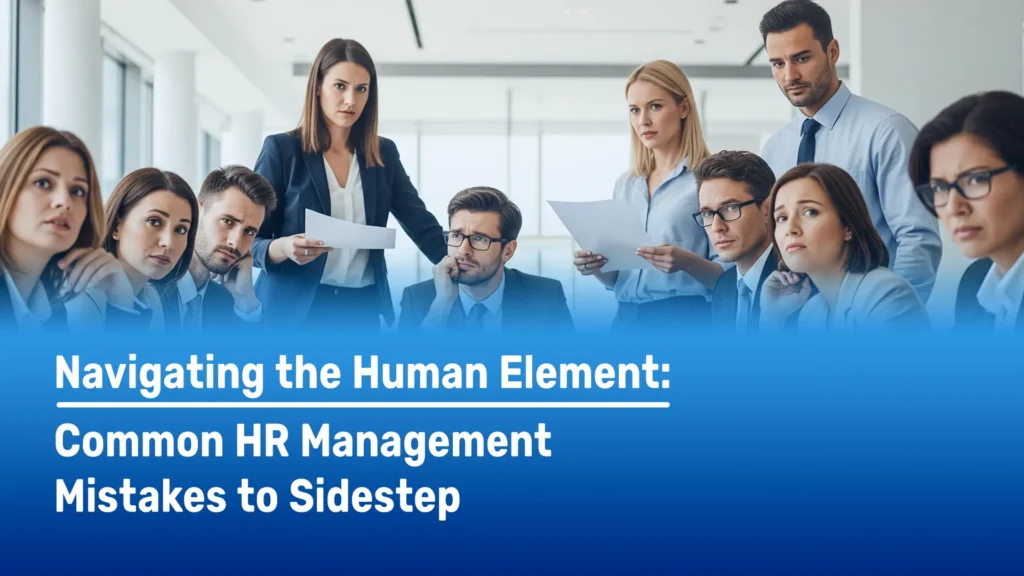Human Resource Management (HRM) is the backbone of any successful organization. It’s about much more than just hiring and firing—it’s about cultivating a productive, compliant, and engaged workforce. Yet, even the most diligent teams can stumble into common HR management mistakes, from compliance oversights to poor communication. These missteps can lead to costly legal battles, plummeting morale, high turnover, and lasting damage to your company’s reputation.
In the United States, navigating the complexities of employment law and workforce dynamics requires constant vigilance. Here are some typical HRM pitfalls that businesses, big and small, should be aware of and actively work to avoid:
1. Flawed Recruitment and Hiring Processes
The foundation of a strong team starts with how you find and select talent.
- Vague Job Descriptions: If you don’t clearly define the role, responsibilities, and required skills, you’ll attract unsuitable candidates.
- Bias in Hiring: Unconscious (or conscious) bias based on race, gender, age, or other protected characteristics can lead to discriminatory hiring practices and a lack of diversity.
- Unstructured Interviews: Inconsistent interview questions and evaluation criteria make it difficult to compare candidates objectively and can introduce bias.
- Poor Candidate Experience: A lengthy, disorganized, or impersonal hiring process can deter top talent and damage your employer brand.
- Skipping Due Diligence: Failing to conduct thorough background checks (where permissible and relevant) can expose the company to risks.
2. Ineffective Onboarding and Insufficient Training
Getting new hires started on the right foot is crucial, as is ongoing development.
- Information Overload (or Underload): Dumping too much information on a new employee at once or, conversely, providing too little guidance can be overwhelming and counterproductive.
- Lack of a Structured Plan: A haphazard onboarding process without clear milestones, introductions, and initial training can leave new hires feeling lost and unsupported.
- Neglecting Ongoing Development: Failing to invest in continuous learning, skill enhancement, and career development opportunities can lead to stagnation and employee disengagement.
3. Subpar Performance Management
Effectively managing performance is key to productivity and growth.
- Unclear Expectations: Employees can’t meet expectations if they don’t know what they are. Lack of clear, measurable goals is a common issue.
- Infrequent or Vague Feedback: Annual reviews are often not enough. Regular, constructive, and specific feedback is essential for improvement and motivation.
- Inconsistency: Applying performance standards differently across employees or teams breeds resentment and perceptions of favoritism.
- Ignoring Poor Performance: Failing to address underperformance promptly and constructively can demotivate high performers and create a drag on the team.
- Biased Reviews: Allowing personal feelings or biases to influence performance appraisals undermines fairness and trust.
4. Non-Compliance with Employment Laws and Regulations
The legal landscape of employment is complex and ever-changing.
- Ignorance of the Law: Failing to understand and adhere to federal laws (like FLSA, FMLA, ADA, Title VII) and specific state/local regulations is a major risk.
- Misclassification of Employees: Incorrectly classifying employees as independent contractors or as exempt/non-exempt from overtime has significant wage and tax implications.
- Poor Record-Keeping: Not maintaining accurate, complete, and confidential employee records as required by law can cause major problems during audits or legal disputes.
- Discriminatory Practices: Any employment decision (hiring, promotion, pay, termination) based on protected characteristics is illegal and damaging.
5. Deficient Employee Relations and Communication
A healthy workplace thrives on good communication and positive relationships.
- Lack of Transparency: Keeping employees in the dark about company decisions, changes, or performance can breed mistrust and anxiety.
- Ignoring Grievances: Failing to have a clear process for addressing employee complaints and conflicts, or not taking them seriously, can escalate issues.
- Disregarding Morale and Engagement: Not actively working to understand and improve employee morale and engagement can lead to higher turnover and lower productivity.
6. Inadequate Compensation and Benefits Management
Your compensation and benefits strategy directly impacts attraction and retention.
- Uncompetitive Packages: Offering salaries and benefits that are significantly below market rates will make it hard to attract and keep good employees.
- Lack of Transparency: Opacity around how compensation decisions are made can lead to perceptions of unfairness.
- Benefits Administration Errors: Mistakes in enrolling employees, calculating deductions, or communicating benefits information can be frustrating and costly.
7. Neglecting Workplace Culture, Diversity, Equity, and Inclusion (DEI)
A positive and inclusive culture is a powerful asset.
- Ignoring DEI: Failing to actively promote diversity, ensure equity in opportunities and pay, and foster an inclusive environment where everyone feels valued and respected.
- Tolerating a Toxic Environment: Allowing bullying, harassment, or other negative behaviors to persist poisons the workplace.
8. Mishandling Disciplinary Actions and Terminations
These sensitive processes require fairness, consistency, and legal compliance.
- Inconsistent Discipline: Applying disciplinary actions unevenly for similar infractions creates a perception of unfairness.
- Lack of Documentation: Failing to document performance issues, warnings, and the reasons for disciplinary action or termination makes it difficult to defend decisions if challenged.
- Jumping to Conclusions: Not conducting thorough and impartial investigations before taking disciplinary action.
- Unprofessional Terminations: Handling terminations insensitively or without regard for legal requirements (e.g., final pay, COBRA) can lead to lawsuits and damage morale.
9. Forgetting Employee Development and Succession Planning
Investing in your people’s future is investing in your company’s future.
- No Growth Paths: Employees who see no opportunities for advancement or skill development are more likely to leave.
- Leadership Gaps: Failing to identify and develop high-potential employees for future leadership roles can leave the organization vulnerable.
10. Outdated HR Technology and Data Mismanagement
Modern HR requires modern tools and practices to avoid Common HR Management Mistakes.
- Manual Overload: Relying too heavily on spreadsheets and manual processes for HR tasks is inefficient and prone to errors.
- Poor Data Security: Not adequately protecting sensitive employee data can lead to breaches and legal liabilities.
- Ignoring HR Analytics: Failing to use HR data to identify trends, make informed decisions, and measure the effectiveness of HR initiatives.
Building a Stronger HR Foundation
Avoiding these Common HR Management Mistakes requires a proactive and strategic approach:
- Stay Informed: Keep abreast of changes in employment law and HR best practices.
- Develop Clear Policies and Procedures: Document your HR policies in an accessible employee handbook and apply them consistently.
- Invest in Training: Train managers and HR staff on legal compliance, effective leadership, and HR best practices.
- Foster Open Communication: Create channels for regular, transparent communication and employee feedback.
- Embrace Technology: Utilize appropriate HR software to streamline processes, manage data securely, and improve efficiency.
- Prioritize Fairness and Consistency: Treat all employees equitably and apply policies uniformly.
- Seek Professional Guidance: Don’t hesitate to consult with employment lawyers or experienced HR consultants when dealing with complex issues.
By recognizing these common HR management mistakes and committing to sound HRM practices, businesses can build a stronger, more engaged, and legally compliant workforce, paving the way for sustained success.
At VXL Payroll we provide Human Resource Management, Payroll and Employee Benefits services. We have been providing quality service to companies, nationwide for over 20 years. You can contact us at 732-515-3200 or at info@vxlpayroll.com to set up a free consultation to see how our solutions can add value to your business.







